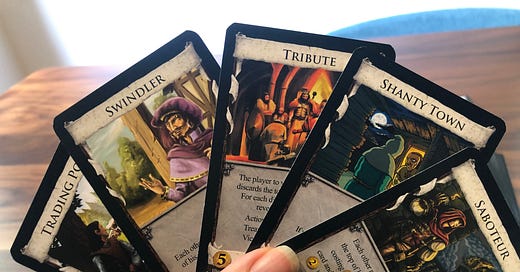Marketing BS: Strategy vs Tactics at Disney, Twitter, FTX, and Dominion Cards
Hi everyone,
Last month, I wrote about radical changes to the pricing structures at Disney Theme Parks. At that time, I didn't imagine I’d be sharing my thoughts about a new(/old) CEO.
A few announcements:
I did not publish last week, but the Fader podcast will be back on Wednesday.
I am blocking the entirety of next week to finish the book, so don’t expect any content for that week, and potentially the week after.
Another project I am working on is an AI that helps write comedy. If you are a comedy writer who for some reason subscribes to Marketing BS and would like to be a beta tester, please let me know.
—Edward
Revolving Doors at Disney
It’s not often that my 7-year-old wants to hear more about a shocking development in business news. But that’s what happened on Sunday evening, when I received the notification that Disney fired CEO Bob Chapek. In a move that raised many eyebrows across the Magic Kingdom, the Disney board announced that Bob Iger — Chapek’s immediate predecessor as CEO — was returning to run the company.
Chapek assumed the CEO mantle in February 2020, just before COVID shut down theme parks. And for Chapek’s first year on the job, Iger served as executive chairman of Disney’s board. Really, then, Chapek was only running things on his own for the last year and a half.
Until recently, Chapek enjoyed the board’s support. In June 2022, he received a three-year contract extension, which the board announced with praiseful comments:
In this important time of growth and transformation, the Board is committed to keeping Disney on the successful path it is on today, and (Chapek)’s leadership is key to achieving that goal. Bob (Chapek) is the right leader at the right time for The Walt Disney Company, and the Board has full confidence in him and his leadership team.
The good times didn’t last long. The November 9 earnings call was a disaster. Chapek revealed that Disney+ had lost $1.47 billion the previous quarter — contrary to industry predictions that the streaming platform would be profitable by Q4 2022. In response to the earnings call, Disney stock dropped more than 13%, one more piece of bad news after a 45% YTD decline in value. Within days the company announced cost reviews and (likely) layoffs.
Ben Thompson at Stratechery cancelled his vacation to write a Disney recap. His take: while Chapek was certainly responsible for some missteps in the last year, he was still following the strategy that Iger had laid out. Thompson notes that if (1) Disney’s current problems are tied to the overall economic environment, AND if (2) Iger tries to abruptly change tactics or strategy, then Disney will be in an even worse place than they are now. But Thompson ends by raising an optimistic perspective. Perhaps Iger needs to return because this is a difficult time for Disney; even small errors in execution will be too costly. In other words, now is not the time for a rookie CEO. Iger’s experience (and gravitas) will be needed to guide Disney through the transition away from cable-like monopolies into a full-stack, direct-to-consumer business.
Chapek may have been following the correct strategy and walking through the correct tactics — but still making enough small errors in execution that the best tactics and strategy wouldn’t have been enough. The interaction between strategy, tactics, and execution depends on how a business is situated with respect to their competitors.
When a business occupies a dominant, monopoly-like position (like Comcast cable), tactics and execution need to be “good enough,” but they are not existential. And when a business is in a very competitive situation (like a local restaurant), then tactics are fairly conventional, but execution is existential.
Strategy becomes far more urgent in rapidly changing environments; in these situations, getting the strategy right can make or break a company. But in those same rapidly changing environments, a perfect strategy can be undermined by the wrong tactics or poorly executed tactics. That is the situation that Disney finds itself in today.
Chess and Dominion
Chess is (obviously) a very strategic game. Players with a mastery of chess strategy will beat neophytes almost every time, even if the masters make a few tactical errors during the game.
Dominion is a tabletop card game (and one of my favourites to play). It’s also the only game I’ve ever encountered where players need to figure out a new strategy every single time they play.
The game has a medieval theme, with monarchs, treasures, etc. Players begin the game with an identical set of 10 cards; each turn, players draw five new cards and have an opportunity to “purchase” additional cards. This process leads to frequent cycling of cards, so players need to consider how their cards will interact with each other and which cards should be purchased, played, and discarded.
In Dominion, the player who develops the better strategy will almost always beat the player who pursues the wrong strategy. But unlike chess, the winning Dominion strategy changes every game (based on the cards that are available). Across various Dominion sets, there are ~400 different cards, so the number of possible combinations is effectively limitless. Every game feels unique and requires players to develop new strategies on the fly. Imagine if two people started playing chess, but the abilities, number, and starting location of each piece were randomized for that game only.
Chess and Dominion both rely on strategy, tactics, and execution. To become a winning chess player, you first need to master the strategy, before moving on to mastering the execution of tactics. In Dominion, players need to master not only the general game strategy, but also the ability to quickly figure out what specific strategy should be played given the “kingdom” of random cards that were randomly selected for that game; then, and only then, can they execute the tactics that will secure the win.
In competitive chess tournaments, the best players are relatively equal in their strategic abilities, so the games are determined by tactics and execution. In contrast, Dominion games can often be decided within the first few turns when one player chooses the “right” strategy and the other is moving in the wrong direction. What make Dominion unique is that players get rapid feedback on whether their strategic choices were correct — they win the game or they lose the game, and games usually take less than ten minutes.
The business world — most of the time, at least — has more in common with chess than Dominion. For many companies, strategy is overrated. The real skill comes from the development of day-to-day tactics that will realize the strategy, as well as the effective execution of those tactics.
But for the situations when strategy DOES matter, if you follow the wrong one, then the best tactics in the world will not be enough to help you succeed. (Yes, there are many examples of high-profile failures of strategy, but they capture disproportionate amounts of attention; the majority of corporate failures happen at the tactical level.)
Twitter and FTX
For any business story — like the Twitter turmoil or the FTX collapse — it can be interesting to look at things through the lens of strategy, tactics, and execution.
For most of Twitter’s existence, the company has held a very nice monopoly-like position, combined with terrible strategy and weak tactical execution. Elon Musk, a power-user of the platform, saw those flaws — particularly the strategic ones — and decided to buy the company.
The first fortnight of Elon’s management has been chaotic to say the least (instituting Twitter Blue and cancelling it, flip-flopping on moderation, firing half of their workforce, watching droves of people quit, writing impulsive emails, and more…). To be fair, many people were so primed to criticize Musk that he could have created Utopia and people would be screaming that it was not all it was cracked up to be. But the pundits are correct that Musk seems to have made some fundamental tactical errors:
Replacing the verified account system with an $8/month subscription led to thousands of trolls impersonating famous people and companies. (The new system had to be rolled back.)
Laying off a significant part of the workforce, including people who were essential to keep the company running. (Twitter frantically asked many to return.)
Issuing an ultimatum to Twitter’s (remaining) employees, demanding they choose between “working long hours at high intensity” or quitting. (Why take this action AFTER the layoffs, and not before?)
Time will tell whether or not Musk has the right strategy for turning Twitter around. Clearly, though, he could have done a better job with tactics and execution. But if Musk’s Twitter fails, we may never know if his strategy was the right one or not — success in a rapidly changing environment can be undermined by any combination of bad strategy, tactics, or execution.
Whereas Twitter’s fate is still in flux, FTX is clearly a failed company. Was it a failure of strategy or tactics?
Alex Tabarrok at Marginal Revolution wrote a great “Explain it like I am five” account of the FTX situation. Tabarrok argues (correctly I believe) that Sam Bankman-Fried (CEO and founder of FTX and Alameda Research), was running a Ponzi scheme from the start. SBF’s strategy was inherently flawed — the only thing that might have saved the company was enough luck to avoid a down market.
SBF himself, in the infamous Vox interview with Kelsey Piper, effectively argues that the problem was not with the strategy, but with the tactics. He and the team made a number of errors that caused the company’s downfall.
Why is SBF pushing a tactical incompetence narrative? Although damning, this approach avoids the ethical and moral (but likely not legal) implications of operating a business that relied on layers of deception. For what it’s worth, John Ray III — the new court-appointed CEO who is running the company through bankruptcy — agrees with SBF that the tactics and execution were definitely subpar. Ray’s court filing include many scathing comments, such as “Never in my career have I seen such a complete failure of corporate controls and such a complete absence of trustworthy financial information as occurred here” — and that from the man who previously oversaw the bankruptcy of Enron!
But just because FTX had incompetent tactics and execution, does not mean that they did not ALSO have an unethical and fragile strategy as well. In a rapidly changing, competitive environment, a company needs exceptional strategy, tactics, AND execution. It only takes one weak point in the chain to lead to failure. And if a company is failing massively at all three, then you get the unprecedented disaster of FTX. One thing I am surprised about: how their strategy allowed them to grow as big as they did before it all came crashing down.
Key takeaways
Disney may have had the right strategy and tactics, but they needed the hand of a master at execution to succeed during these uncertain times.
Elon Musk may have the right strategy at Twitter, but that still might not be enough to save the company if he keeps failing at tactics and execution.
You should all start playing Dominion, as one of the few places where you can get instant feedback on your ability to develop new strategies.
Keep it simple,
Edward
Edward Nevraumont is a Senior Advisor with Warburg Pincus. The former CMO of General Assembly and A Place for Mom, Edward previously worked at Expedia and McKinsey & Company. For more information, check out Marketing BS.





